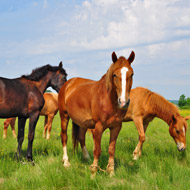
Researchers carry out first large-scale analysis of horse health
The average age of horses in the UK appears to be on the increase, according to new research.
A study by the University of Glasgow's School of Veterinary Medicine found that as UK horses are ageing, the number of them suffering from multiple chronic conditions is also going up.
The findings mirror concerns in the human medical field surrounding how best to deal with an ageing population with more complex medical needs.
Funded by the Animal Welfare Foundation, the study is the first large-scale analysis of horse health in the UK.
Through the use of electronic medical records from seven veterinary practices across the UK, the team were able to estimate the prevalence of nine chronic diseases among horses. They then assessed the effects of these diseases on average life expectancy following diagnosis.
Using these methods the team found evidence of increasing population age. Multiple diseases occurred in 1.2 per cent of the study population and had a significant effect on survival times. Laminitis was involved in 74 per cent cases of multimorbidity.
“The results of the current study taken together constitute an important contribution to the understanding of equine epidemiology, and indicate that veterinarians may encounter greater numbers of aged animals in future," the researchers conclude.
“Chronic disease is prevalent and of serious concern for equine welfare and longevity, and the apparent prevalence of multimorbidity appears to be increasing.”
The team say that further study of multimorbidity in the horse may help to better understand chronic conditions and to formulate appropriate management strategies.



 The RCVS has announced a new version of its 1CPD mobile app, with enhanced features for veterinary surgeons and veterinary nurses to record their continuing professional development.
The RCVS has announced a new version of its 1CPD mobile app, with enhanced features for veterinary surgeons and veterinary nurses to record their continuing professional development.